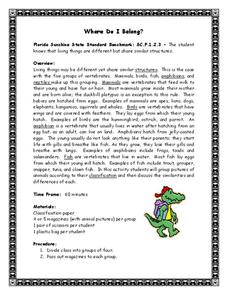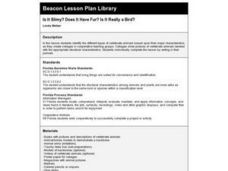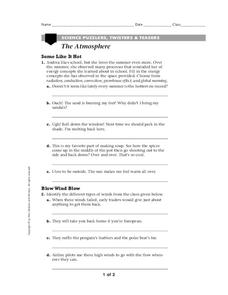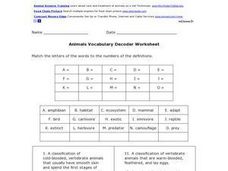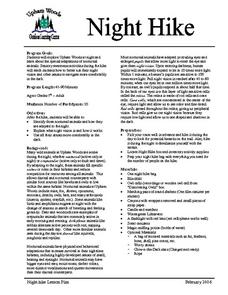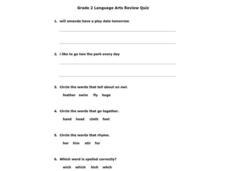Curated OER
Where Do I Belong?
Fourth graders work in groups. They are given magazines. Students cut pictures of five mamals, five birds, five reptiles, five amphibians, and five fish. They place the pictures in a plastic bag. Students switch bags. They are explained...
Curated OER
Is It Slimy? Does It Have Fur? Is It Really a Bird?
Sixth graders identify the different types of vertebrate animals based upon their major characteristics, as they create collages in groups. Collages show pictures of vertebrate animals labeled with the appropriate structural...
Curated OER
Whose Skin
In this animal skin types worksheet, students complete a chart using names of animals, description of animal's skin, where it can be found and illustrating a picture of the animal's skin.
Curated OER
The Great Horned Owl
For this recognizing facts about the Great Horned Owl worksheet, students read fun facts, match illustrations with adaptations, sequence life cycle cards, and read what to do if they find an injured bird. Students solve 16 answers.
Curated OER
Scales, Scutes, and Skins
Students identify the various adaptations of reptiles and amphibians. After distinguishing between reptiles and amphibians, students discuss the ways in which their adaptations aid in their survival. They participate in a hands on...
Curated OER
Animals Around the World
Students study different kinds of animals and what group they belong to. In this animal classification lesson students view different animals and sort them by what group they belong to, for example a snake is in the reptile...
Curated OER
Animals
Students demonstrate and understanding of animal coverings and types of movement through drawings, making of booklets and categorization activities.
Curated OER
Animal Signs
Students discuss the many different types of animal signs that can be used to identify and track animals. They participate in an hands-on activity in which they examine tracks, trails, homes, territory markings, and even "scat" left by...
Curated OER
The Atmosphere
For this atmosphere worksheet, students complete 20 fill in the blank questions about energy concepts, different types of winds, and air pollution.
Curated OER
Variation
Students recognize similarities and differences in plants. In this plants and animals lesson, students begin to classify living things by observable characteristics. Students watch clips from the Internet and play online games. Students...
Curated OER
Classification Wordsearch
In this science worksheet, students examine 20 words in a word bank; all pertain to animal classification. Students locate each word in a word search puzzle.
Curated OER
Oil Spills
Third graders examine the San Francisco oil spill and the effects it has had. In this investigative lesson plan students view a demonstration on oil clean up and how it works. They see how wildlife is rehabilitated, how the...
Curated OER
Animals Vocabulary Decoder Worksheet
Add some decoding to your scholar's review of basic life science terms in this decorder activity, where students match 15 words to their definitions. Words such as mammal and amphibian must be matched to their written definition. The...
Curated OER
Animal Adaptations
students in groups to work on bulletin board, making a list of animal adaptations. They write an example of each body covering and find pictures of animals with these coverings. They mount pictures and label the covering. They should be...
Curated OER
What's Wild? What's Not?
Learners complete activities to differentiate between wild and domestic animals. In this animal types lesson, students bring stuffed animals to class and pictures from magazines or newspaper. Learners put their stuffed animals in a box...
Curated OER
Animals-Spelling Activity
In this animals spelling worksheet, students are given definitions related to animals and their habitat, then fill in missing letters in words to complete the matching animal spelling word.
Curated OER
Classified Information - Part 1: Shapes
Third graders investigate how and why scientists use classification. They discuss classification strategies using animals, and as a class fill in a flowchart with their responses. Next, in small groups they cut out a variety of shapes...
Curated OER
Night Hike
Students explore Upham Woods at night and investigate about the special adaptations of nocturnal animals. They identify three nocturnal animals and how they are adapted to the night. Students explain what night vision is and how it works.
Curated OER
Grade 2 Language Arts Review Quiz
In this language arts review quiz activity, students complete 6 questions that review skills in proofreading, rhymes, spelling and comprehension.
Curated OER
ESL "What?" Quiz-Animals
In this ESL quiz worksheet, students answer a set of "what" questions about animals that are described. Students may click on an answer button for immediate feedback.
Curated OER
Make Sense of Nature
Students participate in this program that heightens their awareness and curiosity of nature as well as their sense of adventure and exploring new surroundings. They identify and choose an object from nature after exploring it with other...
Curated OER
Animals
Second graders discuss the term "endangered". They identify the reasons some animals are in danger of being wiped out. They discover ways humans can help the species survive.
Curated OER
Animals
Learners research and study animals. In this animals lesson, students draw pictures of animal movements and create animals books. This activity is meant to be a culminating activity for a unit on animals.
